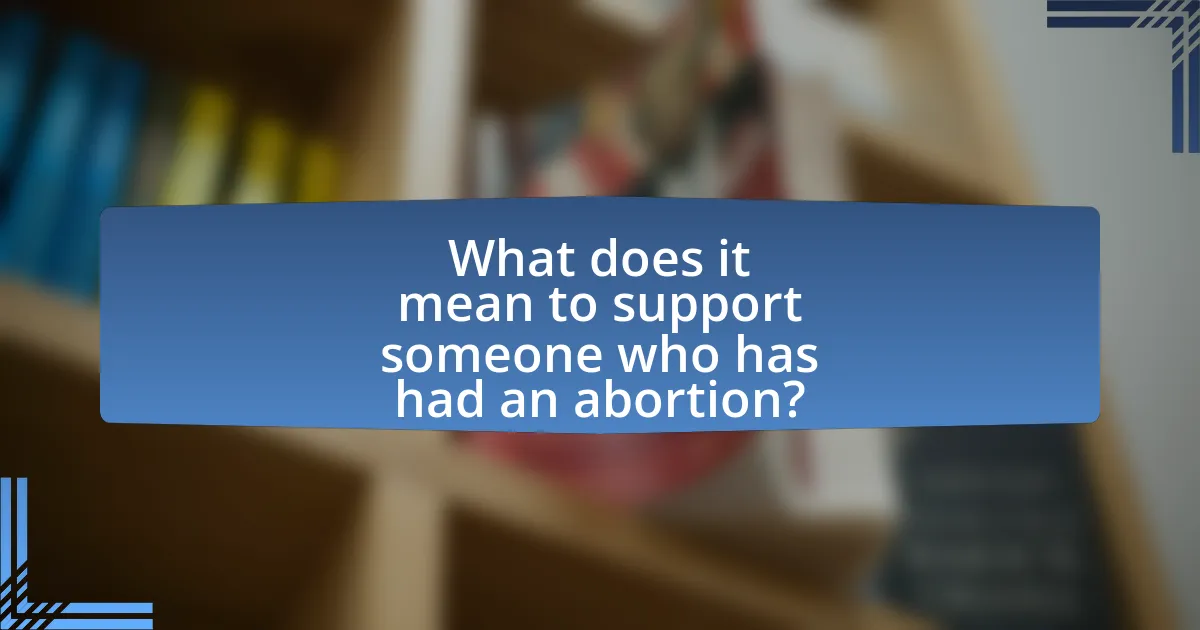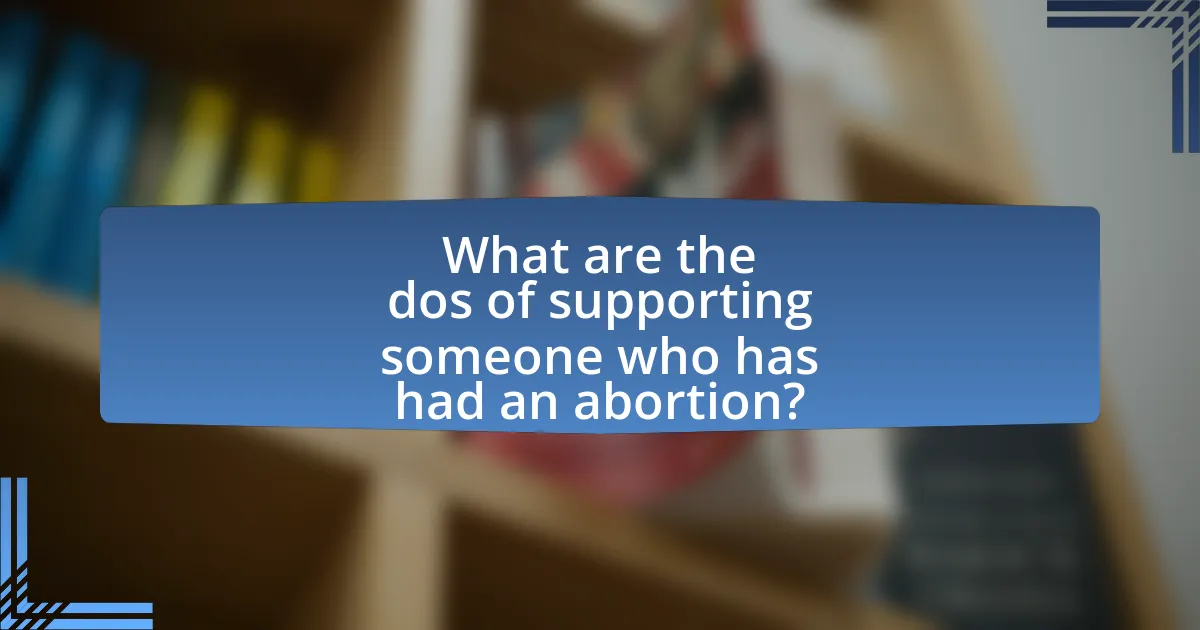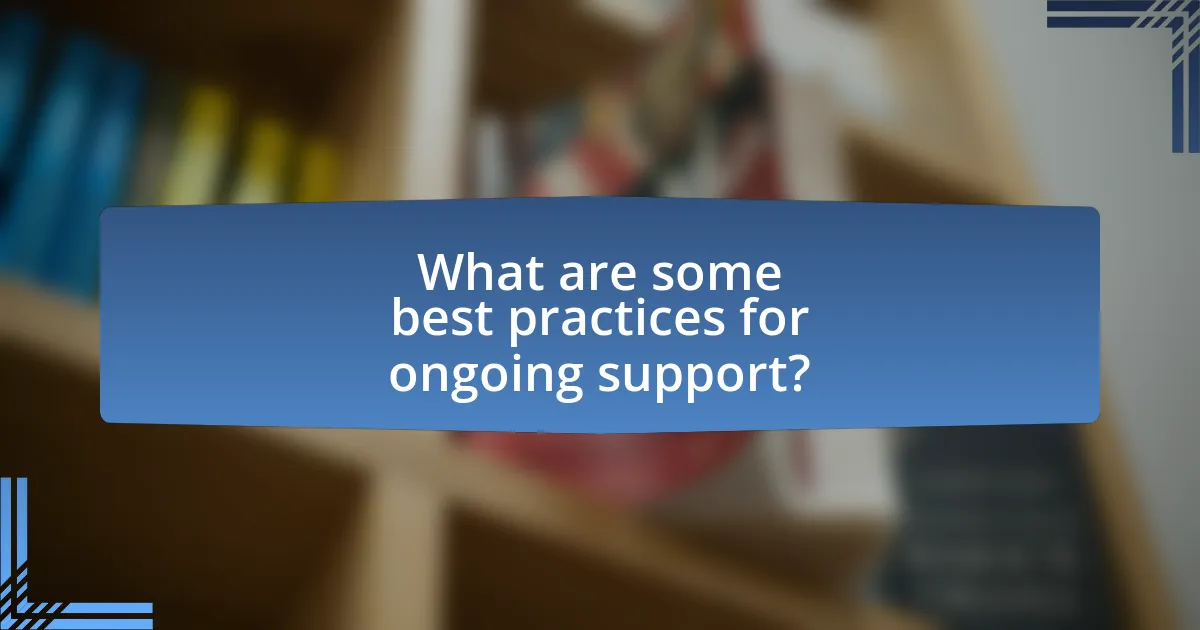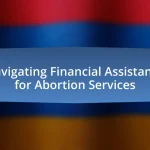The article focuses on how to effectively support someone who has had an abortion, emphasizing the importance of providing emotional, practical, and non-judgmental assistance during their recovery. It outlines the emotional challenges individuals may face post-abortion, such as guilt and anxiety, and highlights the positive impact of a supportive network on mental health outcomes. Key dos include active listening, validating feelings, and offering practical help, while key don’ts involve minimizing their experience and making judgmental comments. The article also addresses common misconceptions about abortion and the significance of societal views in shaping personal support, providing best practices for ongoing support and resources available for both supporters and those affected.

What does it mean to support someone who has had an abortion?
Supporting someone who has had an abortion means providing emotional, practical, and non-judgmental assistance during their recovery process. This support can include listening to their feelings, validating their experiences, and respecting their choices without imposing personal beliefs. Research indicates that emotional support significantly impacts mental health outcomes post-abortion, with studies showing that individuals who receive support report lower levels of anxiety and depression (Guttmacher Institute, 2020). Therefore, being present, offering help with daily tasks, and encouraging open dialogue are essential components of effective support.
Why is support important after an abortion?
Support is important after an abortion because it helps individuals cope with emotional and psychological challenges that may arise during recovery. Research indicates that many people experience feelings of guilt, sadness, or anxiety following the procedure, and having a supportive network can significantly alleviate these feelings. A study published in the journal “Psychological Medicine” found that emotional support from friends and family can lead to better mental health outcomes for individuals post-abortion. This support fosters a safe environment for expressing feelings and facilitates healing, both emotionally and physically.
What emotional challenges might someone face after an abortion?
Individuals may experience a range of emotional challenges after an abortion, including feelings of guilt, sadness, anxiety, and relief. Research indicates that approximately 30% of women report feelings of guilt or regret following the procedure, while others may experience anxiety related to future pregnancies or societal judgment. Additionally, some individuals may face a sense of loss or grief, as the decision to terminate a pregnancy can evoke complex emotions tied to personal beliefs and circumstances. These emotional responses can vary significantly based on individual circumstances, support systems, and pre-existing mental health conditions.
How can support impact the healing process?
Support significantly enhances the healing process by providing emotional stability and reducing feelings of isolation. Research indicates that individuals who receive emotional support during challenging times, such as after an abortion, report lower levels of anxiety and depression. A study published in the Journal of Affective Disorders found that social support is a critical factor in mental health recovery, as it fosters resilience and promotes positive coping strategies. Thus, the presence of supportive friends or family can lead to a more positive healing experience, facilitating both emotional and psychological recovery.
What are the common misconceptions about supporting someone post-abortion?
Common misconceptions about supporting someone post-abortion include the belief that individuals do not experience emotional distress, that they should immediately move on, and that discussing the abortion is always inappropriate. Research indicates that many individuals may experience a range of emotions, including relief, sadness, or guilt, and may benefit from open conversations about their feelings. A study published in the journal “Psychological Medicine” found that while most individuals report feeling relief after an abortion, a significant minority experience negative emotions, highlighting the importance of emotional support. Additionally, the misconception that support should be limited to the immediate aftermath overlooks the ongoing nature of emotional processing, which can extend for weeks or months.
How do societal views influence personal support?
Societal views significantly influence personal support by shaping perceptions and attitudes toward individuals’ experiences, such as abortion. For instance, in cultures where abortion is stigmatized, individuals may feel isolated and unsupported, leading to a lack of emotional and practical assistance from their social circles. Research indicates that societal norms can dictate the level of empathy and understanding offered to those who have undergone abortion, as seen in studies showing that supportive environments correlate with lower feelings of guilt and shame among individuals post-abortion. Thus, the prevailing societal attitudes directly impact the quality and availability of personal support for those affected.
What are the myths surrounding abortion that need to be addressed?
Myths surrounding abortion that need to be addressed include the belief that abortion leads to severe mental health issues, the misconception that it causes infertility, and the false notion that most women regret their decision. Research from the American Psychological Association indicates that the majority of women do not experience long-term psychological harm after an abortion, with studies showing that only about 10% report feelings of regret. Additionally, the American College of Obstetricians and Gynecologists states that abortion does not affect a woman’s future fertility. Addressing these myths is crucial for providing accurate information and support to individuals who have had an abortion.

What are the dos of supporting someone who has had an abortion?
To support someone who has had an abortion, it is essential to listen actively and validate their feelings without judgment. Providing a safe space for them to express their emotions fosters trust and openness. Additionally, offering practical help, such as accompanying them to follow-up appointments or assisting with daily tasks, can alleviate stress. Respecting their privacy and confidentiality is crucial, as many individuals may not wish to disclose their experience to others. Furthermore, educating oneself about the emotional and physical aspects of abortion can enhance understanding and empathy, allowing for more informed support. Studies indicate that emotional support significantly impacts recovery, highlighting the importance of being present and compassionate during this time.
How can I effectively communicate my support?
To effectively communicate your support, express empathy and understanding through active listening and validating feelings. Engaging in open dialogue allows the individual to share their experiences without judgment, fostering a safe environment. Research indicates that emotional support significantly aids recovery after an abortion, as highlighted in a study by the Guttmacher Institute, which found that supportive relationships can alleviate feelings of isolation and anxiety. By consistently checking in and offering practical help, such as accompanying them to appointments or providing resources, you reinforce your commitment to their well-being.
What phrases or words should I use to show empathy?
To show empathy, use phrases such as “I’m here for you,” “It’s okay to feel this way,” and “Your feelings are valid.” These expressions acknowledge the individual’s emotions and provide support. Research indicates that empathetic communication fosters emotional connection and can significantly aid in the healing process for individuals who have experienced abortion.
How can active listening enhance my support?
Active listening enhances support by fostering a deeper understanding and connection with the individual in need. This technique involves fully concentrating, understanding, responding, and remembering what the other person is saying, which can create a safe space for them to express their feelings and experiences. Research indicates that effective communication, including active listening, can significantly improve emotional outcomes for individuals undergoing difficult situations, such as those who have had an abortion. For instance, a study published in the Journal of Counseling Psychology found that clients who felt heard and understood reported higher satisfaction with their support systems and better emotional well-being.
What practical actions can I take to provide support?
To provide support to someone who has had an abortion, actively listen to their feelings without judgment. This action fosters a safe space for them to express their emotions, which is crucial for their emotional well-being. Research indicates that emotional support significantly aids recovery after such experiences, as highlighted in a study published in the Journal of Women’s Health, which found that individuals who received empathetic support reported lower levels of anxiety and depression. Additionally, offering practical help, such as assisting with daily tasks or providing meals, can alleviate stress and demonstrate care.
How can I help with daily tasks or responsibilities?
You can help with daily tasks or responsibilities by offering specific assistance, such as cooking meals, running errands, or providing childcare. These actions can alleviate stress and allow the individual to focus on their emotional and physical recovery. Research indicates that practical support during challenging times can significantly improve mental well-being, as highlighted in a study published in the Journal of Health Psychology, which found that social support positively impacts recovery outcomes.
What resources can I offer to assist their emotional well-being?
To assist their emotional well-being, you can offer access to mental health resources such as counseling services, support groups, and hotlines. Research indicates that individuals who have experienced an abortion may benefit from professional counseling, which can provide a safe space to process their feelings and experiences. For instance, the American Psychological Association highlights that therapy can help individuals cope with emotions related to their decision and improve overall mental health. Additionally, connecting them with local or online support groups can foster a sense of community and shared experience, which is crucial for emotional healing.
What are the don’ts of supporting someone who has had an abortion?
Don’ts of supporting someone who has had an abortion include minimizing their feelings, making judgments about their decision, and offering unsolicited advice. Minimizing their feelings can invalidate their experience, as emotional responses can vary widely among individuals. Making judgments can create a sense of shame or isolation, which is counterproductive to providing support. Offering unsolicited advice may overwhelm them or lead to feelings of inadequacy, as they may already be grappling with complex emotions and decisions.
What should I avoid saying to someone post-abortion?
Avoid saying anything that minimizes their experience, such as “It was just a clump of cells” or “You can always try again.” These statements can invalidate their feelings and create emotional distress. Research indicates that individuals who have undergone an abortion often experience a range of emotions, including relief and sadness, and dismissive comments can exacerbate feelings of isolation and guilt. Instead, focus on offering support and understanding, as this approach fosters a more compassionate environment for healing.
Why are judgmental comments harmful?
Judgmental comments are harmful because they can exacerbate feelings of shame and isolation in individuals, particularly those who have undergone an abortion. Research indicates that negative social feedback can lead to increased psychological distress, as evidenced by a study published in the journal “Psychological Science,” which found that individuals who perceive judgment from others are more likely to experience anxiety and depression. This emotional impact can hinder the healing process and discourage open communication, ultimately affecting the support network available to the individual.
How can I steer clear of minimizing their experience?
To steer clear of minimizing their experience, actively listen and validate their feelings without judgment. Engaging in open dialogue allows the individual to express their emotions and thoughts, which is crucial for their healing process. Research indicates that empathetic listening significantly enhances emotional support, as it fosters a safe environment for sharing (Rogers, 1961). By acknowledging their experience as valid and significant, you demonstrate respect for their feelings and avoid dismissive attitudes.
What actions should I refrain from taking?
You should refrain from making judgmental comments about the abortion experience. Judgmental remarks can create feelings of shame and isolation for the person who has undergone the procedure. Additionally, avoid offering unsolicited advice regarding their feelings or decisions, as this can undermine their autonomy and emotional processing. It is also important not to pressure them to discuss their experience if they are not ready, as this can lead to further distress. Lastly, refrain from sharing their story without consent, as this violates their privacy and trust.
How can unsolicited advice be detrimental?
Unsolicited advice can be detrimental as it may undermine the recipient’s autonomy and decision-making abilities. When individuals receive advice they did not seek, it can lead to feelings of inadequacy, resentment, or frustration, particularly in sensitive situations like abortion. Research indicates that unsolicited advice can create a power imbalance, where the advisor’s perspective overshadows the individual’s personal experience and needs, potentially causing emotional distress. Furthermore, studies show that unsolicited advice often lacks context and relevance, making it less likely to be received positively and more likely to damage relationships.
Why is it important to respect their privacy and choices?
Respecting an individual’s privacy and choices is crucial because it fosters trust and emotional safety. When someone has undergone an abortion, maintaining their confidentiality allows them to navigate their feelings without external pressure or judgment. Studies indicate that individuals who feel supported in their choices are more likely to experience positive mental health outcomes, as they can process their experiences in a secure environment. Furthermore, respecting privacy aligns with ethical standards in healthcare, emphasizing the importance of autonomy and informed consent.
How can I transition from general support to specific needs?
To transition from general support to specific needs, actively listen to the individual and ask targeted questions about their feelings and preferences. This approach allows you to identify their unique emotional and practical requirements, which may include discussing their physical recovery, emotional well-being, or logistical support. Research indicates that personalized support significantly enhances the coping process after an abortion, as individuals often experience a range of emotions and may require different types of assistance based on their circumstances.
What signs indicate that someone may need more support?
Signs that someone may need more support after an abortion include persistent sadness, withdrawal from social interactions, changes in appetite or sleep patterns, and difficulty concentrating. These behaviors often indicate emotional distress or mental health challenges, which can be common following such a significant life event. Research shows that individuals may experience a range of emotions, including guilt, anxiety, or depression, highlighting the importance of providing emotional and psychological support during this time.

What are some best practices for ongoing support?
Best practices for ongoing support include active listening, validating feelings, and providing consistent check-ins. Active listening ensures that the individual feels heard and understood, which is crucial for emotional healing. Validating feelings helps to normalize their experience, reducing feelings of isolation. Consistent check-ins demonstrate care and commitment, allowing the person to express their needs over time. Research indicates that emotional support significantly contributes to recovery after an abortion, highlighting the importance of these practices in fostering a supportive environment.
How can I check in without being intrusive?
To check in without being intrusive, ask open-ended questions that allow the person to share as much or as little as they feel comfortable. This approach respects their boundaries and encourages them to express their feelings at their own pace. For example, instead of directly inquiring about their experience, you might say, “I’m here for you if you want to talk about anything.” This method is supported by psychological principles that emphasize the importance of creating a safe space for individuals to share their thoughts and emotions without pressure.
What are some thoughtful ways to follow up on their well-being?
Thoughtful ways to follow up on someone’s well-being after an abortion include checking in with them through a simple text or call to ask how they are feeling, offering to meet for coffee or a walk to provide a supportive environment, and actively listening to their thoughts and emotions without judgment. These methods demonstrate care and concern, which can significantly impact their emotional recovery. Research indicates that social support plays a crucial role in mental health outcomes following significant life events, including abortions, highlighting the importance of maintaining open lines of communication and providing a safe space for expression.
How can I encourage open dialogue about their feelings?
To encourage open dialogue about their feelings, create a safe and non-judgmental environment where they feel comfortable expressing themselves. Active listening is crucial; it involves giving them your full attention, validating their emotions, and responding thoughtfully. Research indicates that supportive communication can significantly enhance emotional well-being, particularly in sensitive situations like post-abortion experiences. According to a study published in the Journal of Affective Disorders, individuals who feel heard and understood are more likely to engage in open discussions about their feelings, leading to better emotional outcomes.
What resources are available for both supporters and those who have had an abortion?
Resources available for both supporters and those who have had an abortion include counseling services, support groups, and educational materials. Organizations such as Planned Parenthood offer confidential counseling and resources for individuals who have undergone an abortion, while groups like Exhale provide peer support and a safe space for sharing experiences. Additionally, the National Abortion Federation offers resources for both patients and supporters, including information on emotional health and coping strategies. These resources are designed to provide emotional support, information, and community for those affected by abortion.
What professional help can be sought for emotional support?
Professional help for emotional support includes therapists, counselors, and psychologists who specialize in grief and trauma. These professionals provide a safe space for individuals to process their feelings and experiences related to abortion. Research indicates that therapy can significantly reduce symptoms of anxiety and depression, with studies showing that cognitive-behavioral therapy (CBT) is particularly effective in addressing emotional distress following such experiences. Additionally, support groups led by trained facilitators can offer community and shared understanding, which has been shown to enhance emotional healing.
How can support groups benefit both parties involved?
Support groups benefit both parties involved by providing emotional support and fostering a sense of community. Individuals who have experienced similar situations, such as those who have had an abortion, can share their feelings and coping strategies, which helps reduce feelings of isolation. Research indicates that participants in support groups report lower levels of anxiety and depression, as they feel understood and validated by others who have faced comparable challenges. Additionally, those offering support gain insights into the experiences of others, enhancing their empathy and understanding, which can improve their ability to provide effective support.
What are the key takeaways for effectively supporting someone who has had an abortion?
To effectively support someone who has had an abortion, it is crucial to provide a non-judgmental and empathetic environment. Listening actively without imposing personal beliefs allows the individual to express their feelings freely. Research indicates that emotional support significantly aids recovery, as highlighted in a study published in the Journal of Family Issues, which found that individuals who received supportive care reported lower levels of anxiety and depression post-abortion. Additionally, offering practical help, such as accompanying them to follow-up appointments or assisting with daily tasks, can alleviate stress. Respecting their privacy and choices is essential, as it fosters trust and reinforces their autonomy.


